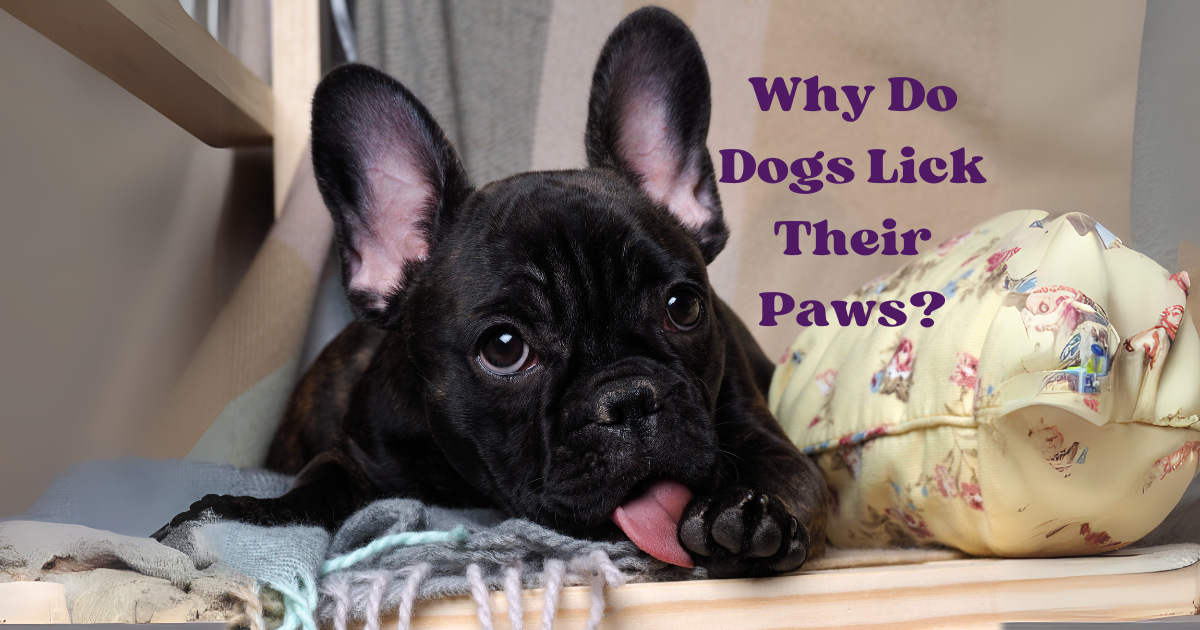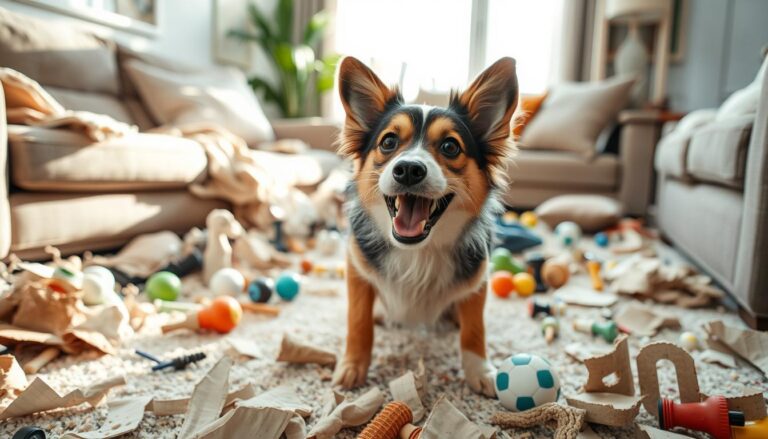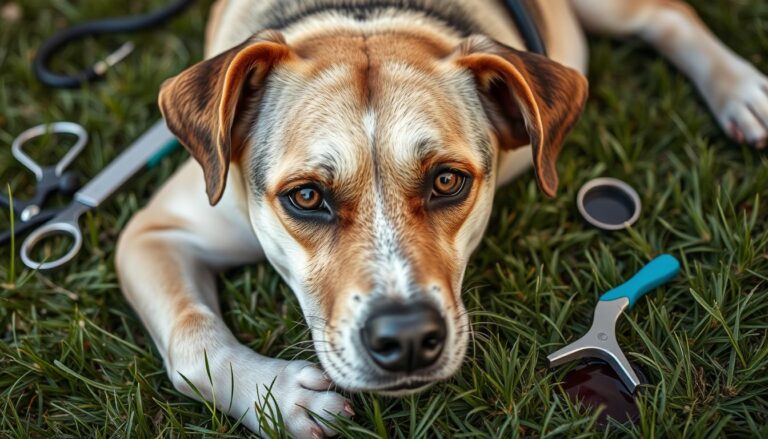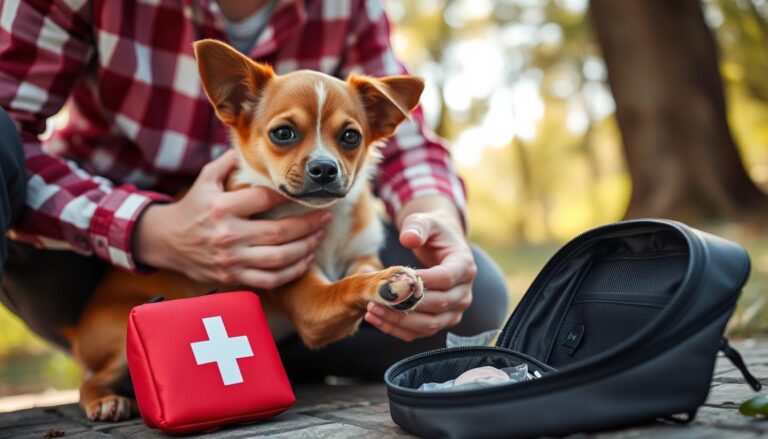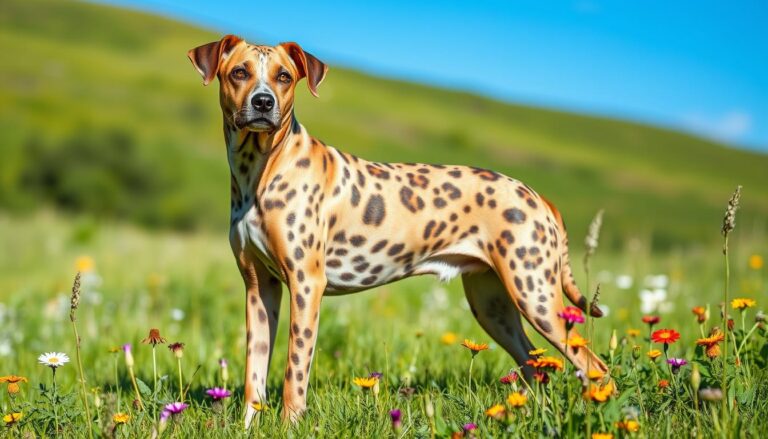Why Do Dogs Lick Their Paws? Uncovering the Causes and Solutions
Introduction
Why Do Dogs Lick Their Paws? If you’re a dog owner, you’ve probably noticed your furry friend obsessively licking their paws. You may wonder, “Why do dogs lick their paws?” Is it just a natural grooming behavior, or is there something more serious at play? While paw licking can be normal, it can also indicate underlying health or emotional issues. Understanding why dogs lick their paws is essential for your pet’s well-being and your peace of mind. In this guide, we’ll explore why dogs lick their paws, the potential causes behind it, and when to seek help to ensure your dog gets the care they need.
Table of Contents
Common Reasons Why Dogs Lick Their Paws
Normal Grooming Behavior
Sometimes, why dogs lick their paws is simply part of their regular grooming routine. Dogs naturally clean their paws to remove dirt, debris, or irritants picked up during walks. Occasional licking that doesn’t seem excessive or lead to other issues is generally nothing to worry about. However, it’s still important to observe how frequently your dog licks their paws.
Allergies and Irritations
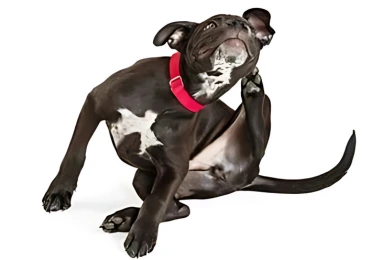
One of the most frequent reasons why dogs lick their paws is due to allergies. Dogs can have allergic reactions to:
- Environmental Allergens: Pollen, mold, and grass can trigger irritation, especially after outdoor playtime.
- Food Allergies: Certain proteins, dairy products, or grains may provoke an allergic response, leading to itchy skin and paw licking.
- Chemical Irritants: Household cleaning products, lawn treatments, or de-icing salts in winter can cause discomfort on contact.
Pro Tip: If you suspect an allergy, consult your veterinarian to identify the exact allergen and discuss dietary changes or allergy management plans.
Dry Skin or Dermatitis
Dry skin is another reason why dogs lick their paws. Various factors like low humidity, frequent bathing with harsh shampoos, or nutritional imbalances can lead to dryness. When a dog’s skin becomes dry, it may crack or itch, prompting them to lick their paws for relief. If your dog is constantly licking their paws, dry skin could be the cause. Incorporating Omega-3 fatty acids into your dog’s diet can help keep their skin moisturized and reduce dryness, potentially reducing the urge to lick their paws excessively.
Parasites and Infections
Parasites like fleas, mites, or ticks can drive dogs to lick their paws incessantly. These tiny creatures can cause intense itching, leading to sores and infections if left unchecked. Additionally, fungal or bacterial infections often manifest with redness, swelling, and a pungent odor around the paws.
Key Sign: If your dog’s paws are red, swollen, or have a foul smell, it could be an infection. In such cases, veterinary intervention is essential for diagnosis and treatment.
Pain and Discomfort
Paw licking can also be a response to pain. Dogs may experience joint pain due to conditions like arthritis, or they could have sustained an injury, such as a cut or splinter, that’s causing them distress.
Observation Tip: If your dog is limping or favoring one leg while licking, it may indicate pain. Monitor their behavior and consult a vet for a thorough examination.
Behavioral Issues
Just like people might chew their nails when stressed, dogs might lick their paws due to anxiety, boredom, or stress. Behavioral licking often becomes a repetitive action, forming a habit that’s hard to break.
Signs of Behavioral Licking:
- Occurs more frequently when the dog is alone or not stimulated.
- No visible signs of irritation or injury on the paws.
How to Identify if Paw Licking is a Problem
Signs to Watch For
While some paw licking is natural, excessive or obsessive licking can be a sign of an issue. Look for these indicators:
- Raw or red patches on the paws.
- Hair loss or thinning fur in the area.
- Visible pain or changes in walking behavior.
- Cracked or bleeding skin.
When to Consult a Vet
If your dog’s paw licking is causing damage, or if you notice symptoms such as swelling, discharge, or persistent licking that interrupts daily activities, it’s time to consult a veterinarian. A professional assessment can help pinpoint whether an allergy, infection, or behavioral issue is at play.
Self-Assessment Tips
- Monitor the Frequency: Observe how often your dog licks their paws in a day.
- Check Triggers: Note if the behavior is associated with specific activities, foods, or times of the day.
- Inspect the Paws: Look for cuts, splinters, or visible signs of irritation.
Effective Solutions to Manage Paw Licking
Home Remedies for Mild Cases
For minor irritation or dryness, you can try some simple home remedies.
Table: DIY Paw Soaks and Treatments
| Ingredient | Amount | Instructions |
|---|---|---|
| Epsom Salt | 1/2 cup | Dissolve in warm water for a 10-minute paw soak. |
| Coconut Oil | As needed | Apply a thin layer to moisturize the paw pads. |
| Oatmeal | 1/4 cup | Mix into a paste with water and apply as a mask. |
These methods can help reduce irritation and promote healing. Ensure that any treatments used are pet-safe and don’t contain harmful chemicals.
this article on home remedies for dogs.
Allergy Management
If your dog’s paw licking stems from allergies, allergy management is essential. Consider the following:
- Change Their Diet: Switch to a hypoallergenic diet with limited ingredients to pinpoint potential food allergies.
- Limit Outdoor Exposure: During peak allergy seasons, reduce outdoor time or rinse paws after walks.
- Pet-Safe Wipes: Clean your dog’s paws with fragrance-free, pet-friendly wipes after walks to remove allergens.
Behavioral Training Techniques
If boredom or anxiety is causing your dog to lick their paws, enriching their environment can help.
- Interactive Toys: Puzzle toys and treat dispensers can keep your dog mentally stimulated.
- Daily Exercise: Ensure your dog gets enough physical activity, which can reduce stress and improve overall behavior.
- Training and Redirection: Redirect your dog’s attention with commands, followed by positive reinforcement.
Medication and Treatments
For more severe cases, medications might be necessary. Always consult your vet before starting any treatment. They might recommend:
- Antihistamines: For allergy relief.
- Antibiotics or Antifungal Creams: For infections.
- Prescription Medications: In cases of anxiety-driven licking, your vet may suggest calming medications or supplements.
Preventative Measures
Regular Paw Care
Regular paw maintenance can prevent many issues that lead to paw licking.
- Weekly Inspections: Check your dog’s paws for cuts, splinters, or signs of infection.
- Moisturize: Use a paw balm or moisturizer, especially during dry seasons.
- Rinse Paws: After outdoor play, rinse paws with warm water to remove dirt and allergens.
Balanced Diet and Supplements
A nutritious diet with Omega-3 fatty acids can help maintain healthy skin and reduce the chance of dryness or inflammation. Speak to your vet about incorporating supplements if needed.
Stress Reduction
Consistency in daily routines can lower your dog’s stress levels. Additionally, tools like calming collars or pheromone diffusers can create a soothing environment.
Conclusion
Paw licking is a common behavior, but it’s essential to understand the underlying cause to keep your dog healthy and comfortable. Whether it’s a grooming habit, allergies, or behavioral issues, recognizing the signs and knowing how to respond can make a world of difference. If you’ve tried home remedies without success or see signs of infection, don’t hesitate to consult your vet.
Caring for your dog’s paws helps maintain their comfort and happiness. Take proactive steps today to ensure your furry friend stays active, content, and paw-licking free.
FAQ Section
Q1: Is it normal for dogs to lick their paws after a walk?
Yes, this behavior is usually a way for them to clean off debris or dirt picked up during the walk. However, if it becomes excessive, it may indicate an allergy or irritation.
Q2: Can allergies cause dogs to lick their paws excessively?
Absolutely. Both food and environmental allergies can trigger itching and discomfort, leading to excessive licking.
Q3: What should I do if my dog is licking their paws and whining?
If your dog is showing signs of pain, such as whining, combined with paw licking, it’s essential to consult a vet. This behavior could signal an injury, joint pain, or a serious infection.

